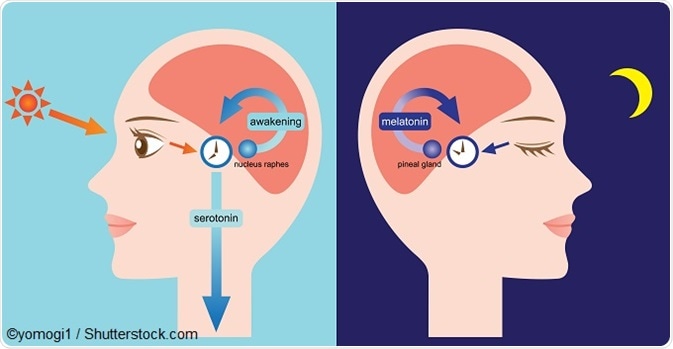Why Do We Sleep?
We are programmed to make sure that we sleep when we are tired, and thus regain our normal performance standards. There are two mechanisms by which the body becomes sleepy or aware of its need to sleep. The first utilizes the natural buildup of the neurotransmitter chemical adenosine in blood. The second depends on the establishment of a circadian rhythm in response to the biological clock.

Adenosine
Adenosine is a metabolite that results from cellular processes. With increasing physiological activity, adenosine levels in the bloodstream increase, and it reaches the forebrain region which regulates the sleep-wake cycle. As the concentrations of adenosine rise in this area, functions that take place during wakeful periods, including attention, memory, and muscular reactions, gradually wind down. Feelings of drowsiness occur and we usually go to sleep.
During sleep, mental and bodily activity are at their lowest, leading to less energy expenditure and adenosine production. Thus adequate sleep drops the adenosine levels back to normal and we wake, feeling energetic and alert.
The circadian clock
Most of our bodily processes operate on a clock running over approximately 24 hours. Thus sleep and waking are also regulated by this clock, which is why most people show a trough of alertness at some time between midnight and 6 am, with another sleepy time occurring between 2 and 4 pm. This is dependent upon the individual makeup as well, so that for some people, the clock rewinds earlier, accounting for the larks, while night owls do their best work late at night and are not fully alert until noon or so.
Physiologic need for sleep
- Immune function
Sleep is an essential need because in many mammalian experiments extreme sleep deprivation has been shown to markedly affect immunity, leading to fatal infection. Even in humans, chronic sleep deprivation for only a week resulted in hypertension and high cortisol (stress hormone) levels, with significant reductions in antibody response to a standardized immune challenge. When the subjects were allowed to sleep as long as they wished to recover from the lack of sleep, these negative changes were reversed.
- Brain and cognitive function
Cognitive impairment, memory loss, and slowing of reaction times, are all associated with chronic loss of sleep, ranging from four to six hours, in contrast with the increasing performance of subjects who consistently slept eight hours a night. Even worse, those who were getting by on too little sleep eventually failed to gauge their increasing need for sleep correctly by the end of the study, which meant they would not feel the need to catch up on their lost sleep despite their objectively deteriorating performance.
In addition to the inability to focus or to think in complex terms, continued sleeplessness may lead to major psychotic features such as depression, hallucinations, and impulsive or risk-taking behavior. Errors of judgment become more frequent.
Sleep is necessary to replenish cellular nutrients and remove toxic metabolites that build up during normal functioning of the brain and body. Neuronal networks are also built up and edited during sleep, to prevent redundant connections from firing and improve the efficiency of required pathways by repetition to encode information. Damage repair may also be a function of sleep.
Deep sleep
Stage 4 of non-REM sleep is characterized by the release of growth hormone in all growing periods, such as childhood and adolescence. Increased anabolism is also a feature of deep sleep. This may contribute to cell growth and repair in response to exposure to toxic chemicals, cytokines, and ultraviolet rays.
Again, areas of the brain that are active when individuals are socially or emotionally engaged, or in the process of taking decisions, seem to go into slow-down mode during deep sleep. This shut down may help to renew functioning skills for the next period of wakefulness, relieving the stress of such activities.
Conclusion
Sleep is essential for normal functioning of mental, emotional, and behavioral processes, aside from the purely physical rest derived from sleep. Many studies have established that too little sleep is associated with metabolic conditions such as heart disease, stroke, diabetes mellitus, and obesity. Sleep deprivation is therefore dangerous, exposing the organism to an immense buildup of stress and fatigue.
References
- http://www.health.harvard.edu/womens-health/repaying-your-sleep-debt
- https://www.ninds.nih.gov/Disorders/Patient-Caregiver-Education/Understanding-Sleep
- https://www.cdc.gov/sleep/about_sleep/chronic_disease.html
Further Reading
- All Sleep Content
- What is Sleep?
- Types of Sleep Disorders
- Promoting Sounder Sleep in Older Adults
- Sleep Deprivation – Inadequate Quantity of Sleep
Last Updated: Feb 27, 2019

Written by
Dr. Liji Thomas
Dr. Liji Thomas is an OB-GYN, who graduated from the Government Medical College, University of Calicut, Kerala, in 2001. Liji practiced as a full-time consultant in obstetrics/gynecology in a private hospital for a few years following her graduation. She has counseled hundreds of patients facing issues from pregnancy-related problems and infertility, and has been in charge of over 2,000 deliveries, striving always to achieve a normal delivery rather than operative.
Source: Read Full Article
